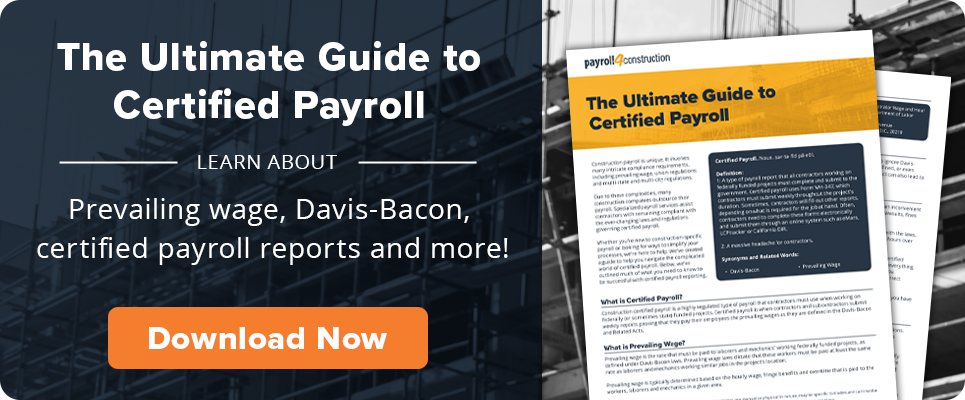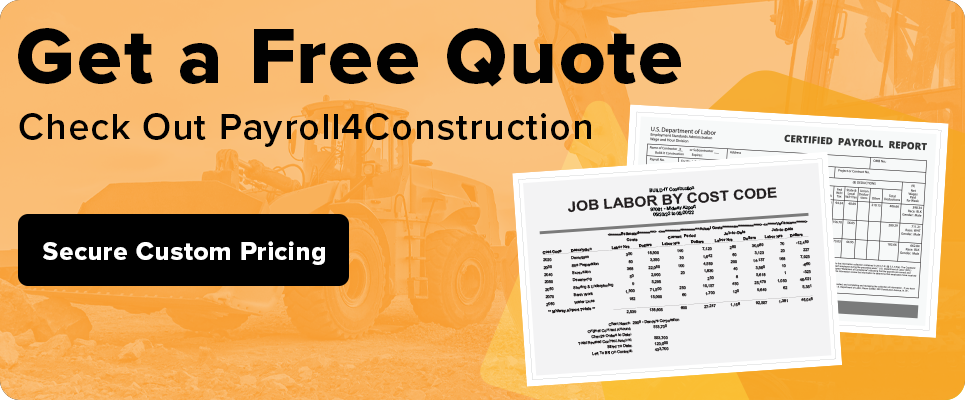
November 14, 2023
Construction payroll is already difficult, but multi-state payroll requirements add a whole additional layer of administrative challenges. If mistakes are made, businesses even chance a significant degree of legal risk.
Multi-state payroll comes into effect when a company’s employees work in multiple states. For example, Employee A worked in Ohio on Monday and Tuesday and then attended to a project in Pennsylvania until Friday. This adds tracking difficulties to tasks like monitoring wage rates, withholding and reporting taxes, and administering benefits.
Furthermore, multi-state payroll gets even trickier because it can be applied in a variety of ways. Like in the example above, employees may work multiple jobs in multiple states in a single pay period. Or they can work six months in one state before being transferred to another state for just a few weeks.
If you’re looking to expand your company and take on projects with a larger scope, you may begin working on multi-state opportunities more frequently. Preparing for the challenges and knowing how to handle the additional associated payroll regulations will help you remain compliant and pay your workers with precision.
Challenge #1: Navigating Varying Payroll Laws and Regulations
Each state has its own set of rules regarding minimum wage, overtime, and pay frequency. Even bordering states may have polar opposite payroll laws. This means that construction administrators must be familiar with the requirements of each jurisdiction where their crews work. Failure to comply with these state-specific regulations can result in costly penalties and even legal troubles.
Challenge #2: Multi-State Taxation
When it comes to working multi-state jobs, taxation should be at the forefront of every contractor’s mind.
Employees working across state lines can trigger tax obligations in multiple states (like needing to pay income tax for both the state where the employee lives and the state in which the employee is working). For this reason, contractors need to understand income tax rules, reciprocity agreements, and the tax withholding requirements of all the states where their employees work.
Failure to correctly withhold taxes can lead to underpayment or overpayment of taxes – both of which are not ideal. Employers who willfully fail to collect proper tax withholdings open themselves up to penalties, back payments of missed interest, IRS audits, and litigation.[1]
To help avoid this, employers must establish and maintain a system that allows them to accurately calculate and distribute tax withholdings based on all the work locations of their employees.
Don’t forget: Construction companies will also need to file payroll tax returns in the various states where they’ve worked. This requires intricate knowledge of each state’s business tax forms and deadlines.
Challenge #3: Recordkeeping and Reporting Compliance
As mentioned, construction companies maintaining mobile workforces face administrative difficulties managing and tracking each employee’s work hours, overtime, and travel expenses. For legal protection, it’s important to know where employees worked, what they did, and how long they were on the job site, regardless of how many localities are involved.
If your business ends up in litigation due to a payroll dispute, having a record of payroll basics (such as a log of all employees’ hours, tax withholdings, and pay) can be vital for preserving your company.
Further, contractors completing publicly and federally funded jobs must keep an accurate and organized record of payroll while work is being completed and for at least three years after, according to the Davis-Bacon Act. The records that need to be maintained must include the name, address, and social security number of all the laborers and mechanics who worked on the job.[2] These reports can be intricate and time-consuming to generate, especially when working in multiple states.
Adding to the challenge, publicly and federally funded jobs mandate prevailing wages and weekly certified payroll reports. If these jobs cross state lines, prevailing wages may be different even for the same project.
Accurate recordkeeping is not only vital for in-house payroll but is also required for companies to comply with labor laws, including the Fair Labor Standards Act (FLSA).
The Best Fix: Products and Services That Handle Construction Payroll Complexities.
Construction-specific software programs and services can automate the payroll process and help companies remain compliant, especially when looking at multi-state jobs.
Many of these programs automatically calculate multiple rates, states, and trades, ensuring accuracy. These construction-specific programs can also generate a variety of payroll and job costing reports in minutes, saving companies hours of administrative time.
For construction companies who would prefer to outsource payroll-related tasks, construction-specific payroll processing services can be the answer. These services take the burden of payroll off a contractor’s shoulders – many will cut checks, handle direct deposits, and even submit W-2 forms.
When looking for the best payroll solution, there is no right or wrong answer – it’s really dependent on a company’s unique needs and preferences.
Foundation Software – a construction software company serving the industry for nearly 40 years – has all the tools contractors need to run the business side of construction. Payroll4Construction is Foundation’s standalone construction payroll service. It can easily process multiple states, rates, and trades on a single timecard and generate dozens of free construction reports.
Multi-state payroll is challenging, but construction-specific accounting software and services can provide much-needed relief to contractors. By offering tailored solutions to address the unique complexities of multi-state payroll, these solutions and services can spell the difference between success and utter frustration.
[1] https://www.justice.gov/tax/employment-tax-enforcement-0
[2] https://www.dol.gov/agencies/whd/government-contracts/protections-for-workers-in-construction/frequently-asked-questions
Share Article
Keep on current news in the construction industry. Subscribe to free eNews!


